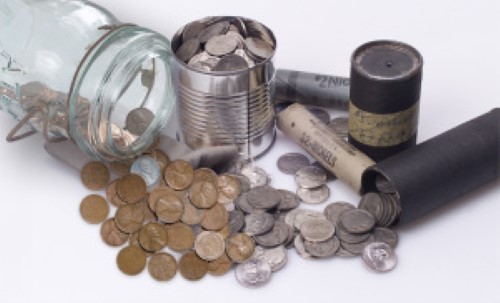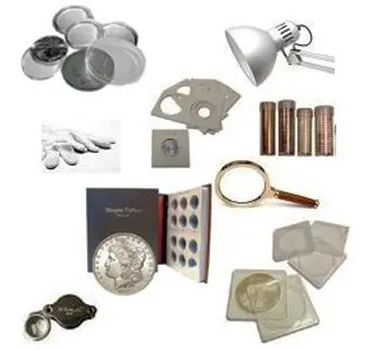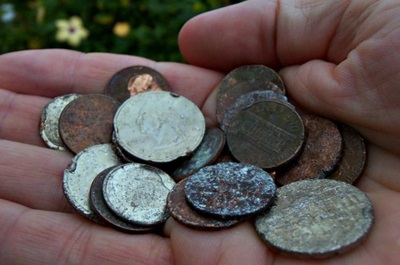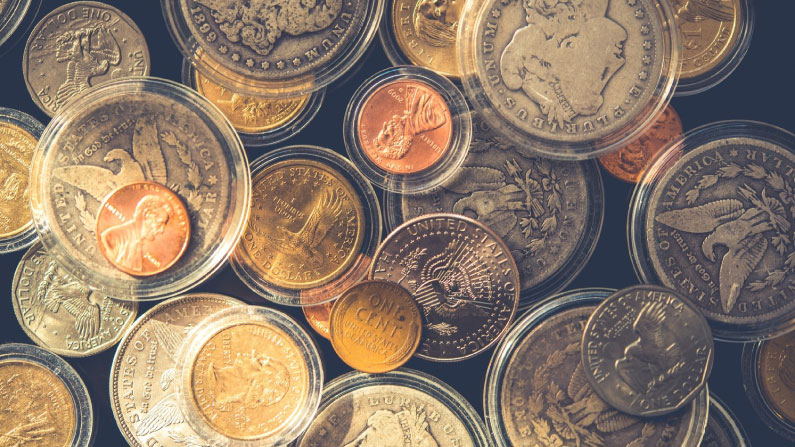Since ancient times, people have enjoyed collecting coins for their value and beauty. Coins are often sought after if they are made from precious metals like gold or silver, if they are rare coins, or if they have some type of historical significance. An experienced coin collector knows that their coins will always be worth more if they are in good condition and they also understand that coins are not indestructible. All types of metals used to make coins, except for gold, are chemically reactive metals that can become damaged over time by certain environmental factors.
Whether you have a coin collection to admire the beauty of your coins, or to make a profit selling your coins that have appreciated in value, it is beneficial to know how to store and care for your coins. There are many environmental factors that can damage your coins and lower their value. Proper coin storage will help protect your coins from damage and preserve their aesthetic appeal and monetary value. This guide contains important tips to protect your coin collection from the most damaging environmental factors and store them safely.

Main Causes of Coin Damage
Most coins contain the metals silver and copper which are very reactive metals. The type of corrosion that copper experiences for example can be seen on old pennies that have dark green spots. The following are the main causes of coin damage that can threaten your collection:
- Humidity: Humidity is the most common cause of damage to coins because silver and copper will react chemically to moisture. This is also the toughest environmental factor to protect against because moisture can get anywhere. Certain coin holders will effectively reduce the risk of damage to your coins from moisture, but they are not guaranteed 100 percent effective.
- Extreme Temperatures: Extreme heat does not directly harm coins, but it does cause other factors like moisture, air pollution, and acids to damage coins faster than usual. Extreme cold temperatures can also lead to coin damage if it causes condensation on the surface of the coin.
- Acids: Acids can do significant damage to your coins and they commonly come from coin holders and storage supplies made from paper or cardboard. Acids used in these materials can cause coin toning and tarnishing when they come into contact with the coins. You should be mindful of using coin storage materials that may contain acids and keep your coins away from other household sources of acids including adhesives and cleaning solutions.
- Chlorine: Chlorine is a harsh chemical that can significantly corrode coins and cause major toning. The most common way coins are exposed to chlorine is from plastic coin holders that contain PVC (polyvinyl chloride). Make sure your plastic coin holders are PVC free.
- Air Pollution: Common air pollution can have a damaging effect on coins over time. You should keep your coins protected from the outside air as much as you can, especially if you live in an urban area.
- Improper Handling: Handling coins is a common and preventable source of coin damage. The acids and oils of your fingers can cause damage to the surface of the coins which is why you shouldn’t handle them directly.
Coin Cleaning
When people begin collecting coins, it is common for them to have questions about the best ways to clean their coins. The correct answer is you should never clean your coins. Coins that have aged naturally are more valuable than coins that have been cleaned because they have a natural color and authentic originality. In addition, cleaning coins with visible signs of wear and tear will only make visible wear marks more obvious which will make the coins unappealing to collectors. Cleaned coins are avoided by most serious collectors and sell at much lower prices than their uncleaned counterparts.

Coin Storage Supplies
The best way to protect your coins from the damaging environmental factors discussed above is to use coin storage supplies such as folders, coin albums, 2X2 coin holders, flips, and slabs. Each coin storage product has advantages and disadvantages that should be considered when deciding which of these products is best for your coin collection. The main coin storage options are explained in further detail below:
- Folders: Coin folders are folding sheets of cardboard that contain slots to hold coins. They are one of the most inexpensive options for coin storage and are best for low value coins. The main drawback of coin folders is that only one side of the coin is seen and exposed to air. The side of the coin that is unexposed can experience toning as a result. There is also a risk of coins falling out of the folder when the folder is handled because there is nothing keeping them secured in place.
- Coin Albums: Coin albums are a more sophisticated option to store a coin collection than folders. Albums consist of multiple pages that contain holes to put the coins, and each coin slot has a clear mylar strip that protects the coins and allows both sides of the coin to be seen. This is a great option for storing your more valuable coins. Some coin albums can hold up to 100 individual coins. You must be careful when removing coins from the album because the mylar slide can leave a mark if the coin slides against it.
- 2X2 Coin Holders: These square cardboard holders consist of a piece of cardboard that folds over the coin and a viewing circle covered by cellophane that displays the front and back of the coin. They are called “two by twos” because they are generally two inches by two inches in size, but they do come in several different sizes to store different types of coins. The folded cardboard must be stapled shut and crimping the staples will help reduce exposure of the coin to the air. You must be carefully to avoid scratching the coin on the staples when removing it from this holder. These coin holders cannot be reused.
- Flips: These holders are similar to 2X2s but are made from see-through plastic instead of cardboard and cellophane. Flips fold in half and can hold a coin on each side and unlike 2X2s, they can be reused many times. One drawback with flips is that the plastic generally contains PVC which can be damaging to the coin over time. Flips that do not contain PVC are harder than those that do, and also more likely to break. It is best to use flips as temporary storage until you find a better option.
- Slabs: Slabs are the most secure storage option for individual coins. They are hard plastic holders that generally have a PVC free plastic inert around the coin and they are sonically sealed to be as air tight as possible. Coins with high grading and authentication from NGC, PCGS, and other institutions should be stored in slabs. The only problem with slabs is that storing multiple slabs can be difficult. There are special types of boxes available to store multiple coin slabs.

Where to Store your Coin Collection
After you have determined which coin storage supplies are the best for your coin collection, the next thing to consider is where to store your coins. Remember, while the coin storage supplies described above can protect your coins fairly well, they cannot completely shield them from the effects of certain environmental factors. The following are the safest places to store your coins:
- Bedroom/ Den: When storing your coin collection in your home, you must keep them in a room that does not have extreme temperatures or humidity. The bedroom or a den is usually the safest place because these areas tend to have a comfortable temperature and humidity level. Make sure you keep your coins in a room far enough away from the kitchen and bathroom so that heat, moisture, and cooking oils don’t affect the coins.
- Safe Deposit Box: Keeping your coin collection in a safe deposit box at the bank is the safest storage option, but can also be quite expensive. There is also a slight risk of exposure to moisture as bank vaults are constructed with materials that emit water vapor in case of a fire. Over time, the moisture in the vault can leak out and make the vault humid. Putting a silica gel pack in the safe deposit box will help absorb any excess moisture.
- Home/ Office Safe: A safe in your home or office is a good, safe option for storing your coin collection. If you store your coins this way, you should put a silica gel pack in the safe to absorb moisture for the same reason as in a safe deposit box in a bank vault.
- Metal Cabinet: Wood cabinets have coatings and adhesives that contain chemicals that can damage your coins. You should avoid keeping your coins in wooden cabinets or bookshelves. It is safer to keep them in a metal cabinet, but make sure your metal cabinet is located in a place within your home with a low moisture level. Metal can attract moisture and experience condensation.
If you have started a coin collection, it is important to keep your coins adequately protected, even if you do not have any high value coins. Choosing the right coin storage supplies and keeping your coin collection somewhere where it won’t be affected by moisture or extreme temperatures will help you protect your coins from damage.
If you would like more guidance on the best ways to store your coins, you can talk to our professionals at PGS Gold & Coin. Our professionals can recommend coin storage options based on the coins that you have in your collection. We are also a premier coin dealer in the Chicago suburbs and have a wide selection of coins in our inventory for those looking to add to their collection. If you are ready to sell your coins, we offer top dollar for rare, gold, and silver coins and will give you cash on the spot. Come in to one of our PGS Gold & Coin stores to learn more about coin collecting from our experts.

